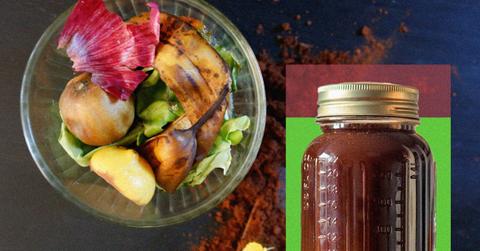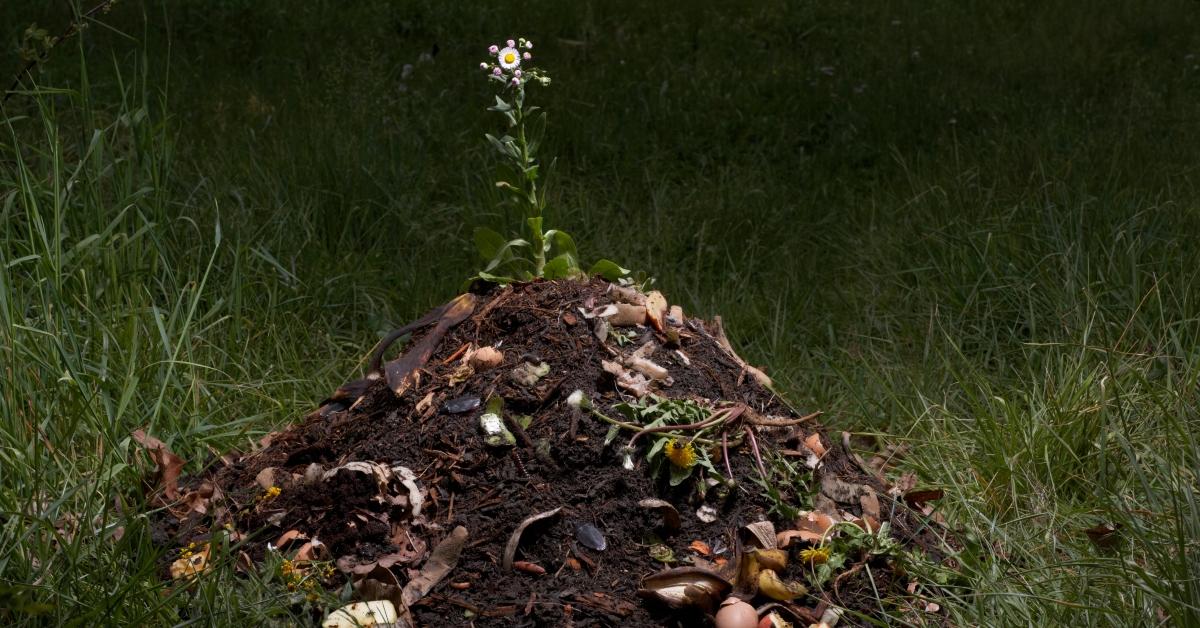Organic Growing and Soil Experts Spill the Tea on the Microbial Magic of DIY Fertilizer Tea (Exclusive)
Published July 20 2023, 2:47 p.m. ET

Whether you enjoy high tea, low tea, or the occasional Long Island iced tea, there's evidently something about the earthy, aromatic beverage that soothes souls across the globe. So, the next time you sip on a calming cup of Earl Grey in the comfort of your verdant garden (and what a tranquil image that is), consider giving your plants some tea as well — aka fertilizer tea or compost tea.
Natural DIY liquid fertilizers are all the rage in an agricultural world that has long been dominated by nasty chemical fertilizers — which, according to Hunker, can cause "waterway pollution, chemical burn to crops, increased air pollution, acidification of the soil, and mineral depletion of the soil."
Not only are organic liquid fertilizers healthier for all life on Earth, they're sustainable! So, after gobbling a banana, mowing your lawn, brewing coffee, or frying up some eggs, reconsider tossing the waste. With just a few ingredients, composting and zero-waste newbies alike can whip up a batch of nutrient-rich fertilizer tea at home.
Via email, Green Matters spoke exclusively with organic growing and soil experts Troy Hinke, Aaron Deacon, and Sean Smith about the science behind fertilizer tea, the dangers of chemical fertilizers, and their favorite DIY fertilizer tea "recipes" (none of which you can find on Food Network's website).
Let's spill some tea.

Compost tea and herbal tea and manure tea, oh my! Breaking down the different types of fertilizer tea.
If your thumbs are as numb and hopeless as the wilting calathea in your kitchen (that prayer plant was doomed from the start), fertilizer tea is likely a foreign concept to you. In a nutshell, fertilizer tea is a liquid plant fertilizer that is prepared similarly to a pot of tea. And just as there are several different types of beverage tea (e.g. black, green, white, oolong, pu-erh, herbal, et cetera), there are different categories of fertilizer tea: compost, herbal, and manure.
According to soil microbiologist, compost/vermicompost specialist, and Living Roots Compost Tea owner Troy Hinke, "a liquid compost amendment (tea or extract) is going to provide a healthy dose of microorganisms to plants and soils. These microbes work in symbiosis with plants, decomposing organic matter in the soil and cycling nutrients in a plant-available form."
In our exclusive e-interview, Hinke — host of What's Brewing? A Compost Podcast — clarifies that compost tea (an uber-efficient liquid form of compost) "does provide nutrients and acts as a fertilizer," but considering the microbes do much of the heavy lifting, "compost tea can be considered more of an inoculant."
For context, Amy Landers of Gardens That Matter defines inoculation as "the introduction of beneficial microorganisms to seeds or a plant's roots before planting." Rhizobium bacteria and mycorrhizal fungi are both types of inoculants.
Aaron Deacon — an organic growing expert and founder of sustainable organic fertilizer and pesticide company Bios Nutrients — has a slightly different take on the classification of compost tea. The "blue-eyed scientist" tells Green Matters that "teas should not be seen as a 'fertilizer.'" Why? Well, "they add billions of living organisms to soil that will break down nutrients for your plant to eat and protect plants from pests and disease. It creates a true living soil."
Deacon feels strongly about this, frequently comparing soil to our stomachs — a muscular organ that is sometimes called our "second brain."
"You chew food which then enters your stomach, where it goes through a process of fermentation and decomposition thanks to trillions of bacteria and fungi," Deacon explains. "The nutrients are then released from the food and are absorbed by your body. If you feed your body properly you become more resistant to infections and disease and can grow stronger. The exact same thing happens with plants! We have been conditioned by synthetic fertilizer companies that you need to 'feed your plant,' but in reality you must 'feed your soil' and it will feed your plants."
Concerning herbal fertilizer tea or plant-based fertilizer tea (yes, it's vegan), Sean Smith — an award-winning urban gardener and the head proprietor and brewer at Toronto-based Crooked Farmz — explains that it offers exactly "what it says," as it's "meant for fertility, applying nutrients to the plants."
Hinke — who favors liquid compost — says that "plant-based liquid fertilizers are mainly going to provide some types of nutrients that were contained in the plant." So, if you're applying an herbal tea made with comfrey, nettle, and grass clippings, nutrients from those plants will nourish your garden. Unfortunately, it's a bit of a gamble, as "a person is likely not going to fully know the nutrients they are providing."
Now, let's talk stinky stuff. Both horse and cow manure are known to offer wondrous nutrients to gardens, lawns, and farms alike. Still, Smith warns that manure fertilizer tea — which is essentially just a concoction of aged manures soaked in water — is "riskier" than compost and herbal fertilizer teas, as "manures can contain pathogens that might be undesirable for food-growing if used incorrectly."
The University of Nebraska-Lincoln's Institute of Agriculture and Natural Resources wrote that harmful bacterial pathogens like E. coli O157:H7, Salmonella, Listeria, and Clostridium are found in livestock manure. Plus, protozoa (a class of parasite) lurk in manure and can cause "severe diarrhea, nausea, fever, vomiting, and fatigue in humans."
Hinke adds that "making a manure tea could help these pathogens to breed and, if applied to produce, could have deadly consequences."
Unlike Smith and Hinke, Deacon uses manure in his fertilizer teas. However, he doesn't solely rely on the controversial excrement. He makes a Franken-tea of sorts, because "variety truly is the spice of life."
"I have always preferred to use a combination of all three components. Compost and manure will add a wide variety of microorganisms, while the herbs or plants provide a food source for bacteria and fungi to multiply," he tells Green Matters.
Brewing time is another factor that divides the teas.
Considering they've already undergone a decomposition process, compost and manure teas "can be made in 24 to 36 hours in an aerobic environment," according to Deacon, while "plant-based tea will take much longer (10 to 60 days) and is generally better when done in an anaerobic environment."
Traditional chemical fertilizers are so out. Here's why you should opt for organic fertilizer tea.
We briefly touched on the eco-horrors of chemical fertilizers, but our trusty plant dudes have even more insight.
"Chemical fertilizers create weak, dependent plants, not to mention the chemicals leach out of the soil and into water systems. Compost teas, by contrast, create biodiversity belowground and foster a strong ecology aboveground," Smith explains.
Besides, chemical fertilizers (some of which contain "elevated levels" of arsenic, cadmium, and lead, per the Minnesota Department of Health) aren't entirely successful, as "plants take up only a fraction of the nutrients provided by synthetics," according to Hinke. He adds that nutrient runoff from chemical fertilizers contributes to harmful algal blooms.
"These algal blooms rob the water of oxygen, killing off large swaths of aquatic life," Hinke explains.
Deacon also has much to say on the topic, jumpstarting the conversation with the simple fact that "plants have already been thriving for millions of years without synthetic fertilizers." But he doesn't want us to instinctively associate the word "chemical" with ecological demise, as "everything, including our bodies, is chemical in nature."
Synthetic fertilizers "completely negate the requirement for micronutrients, enzymes, DNA, microorganisms, and many more components that compost teas and organic fertilizers contain naturally," Deacon tells Green Matters.
"By using natural fertilizers and teas, you can significantly reduce pests and disease, increase water retention, increase nutrient availability (which creates much higher quality food both in terms of flavor and nutrition), and build a living ecosystem that can support plant life for generations."
Looking to make your own DIY compost tea? While Smith keeps it simple, relaying that "well-made, aged homemade compost," a permeable bag, water, molasses, an aquarium air pump, and "12 hours of aeration" are all a plantsman needs to brew a fabulous compost tea, Hinke and Deacon share their favorite recipes.
Troy Hinke's compost tea recipe:
Ingredients and equipment:
• Elastic top 5-gallon paint strainer bag (or old T-shirt)
• 5 gallons of clean water
• 3 to 4 cups of finished compost or vermicompost
• 1 tablespoon of humic acid
• 1 teaspoon unsulphured blackstrap molasses
Directions:
1. Fill a clean 5-gallon bucket with clean water.
2. Mix in the humic acid and molasses.
3. Place compost/vermicompost in the paint strainer bag and suspend in the bucket using the elastic top.
4. Massage the compost for 3 to 5 minutes, squeezing it and working it to break it down into the smallest particles possible.
"This solution can be used immediately or aerated for 12 hours and then used," Hinke explains. "Liquid compost amendments are great for foliar applications or soil soaks."
Regarding timing, Hinke says that "the length of time it takes to brew to reach a peak population of microbes is completely dependent on the ambient temperature. Compost tea should be brewed at ambient temperatures so that the microbes active at that certain range of temperatures will work with the plants and soils they are applied to."
"Bacteria and their predators made up of protozoa (both flagellates and amoebae) are what will proliferate in a brew," he adds.
Aaron Deacon's compost tea recipes:
"There are two main ways to make tea at home: soaking or aerating," Deacon shares. Despite the cost of equipment, he prefers the aeration method because "it's a much more controllable process and significantly increases microbial content."
Ingredients and equipment for basic recipe:
• Sock or old T-shirt
• 2 cups of high quality local compost (e.g. leaves, food scraps, et cetera) or manure (e.g. horse, sheep, cow, et cetera)
• 60 milliliters of blackstrap molasses
Ingredients and equipment for advanced recipe:
• Paint strainer bag or 400 micron mesh bag
• 2 cups of high quality local compost (e.g. leaves, food scraps, et cetera) or manure (e.g. horse, sheep, cow, et cetera)
• 30 milliliters of blackstrap molasses
• 30 milliliters of kelp meal
• 30 milliliters of alfalfa meal
• 30 milliliters of rock dust (e.g. gypsum, basalt, et cetera)
Directions:
1. Add your compost to your sock, T-shirt, or bag and tie the top tightly. (Add remaining dry ingredients for the advanced recipe.)
2. Fill bucket three quarters of the way with unchlorinated water
3. Add molasses to the water and stir to dissolve.
4. Place the bag in water.
5. Add an air stone or aeration device into the bucket.
6. Place the air pump in a location that is higher than the top of the bucket and turn it on.
7. Let the mixture bubble for 24 to 36 hours (foaming may occur later in process from microbial activity).